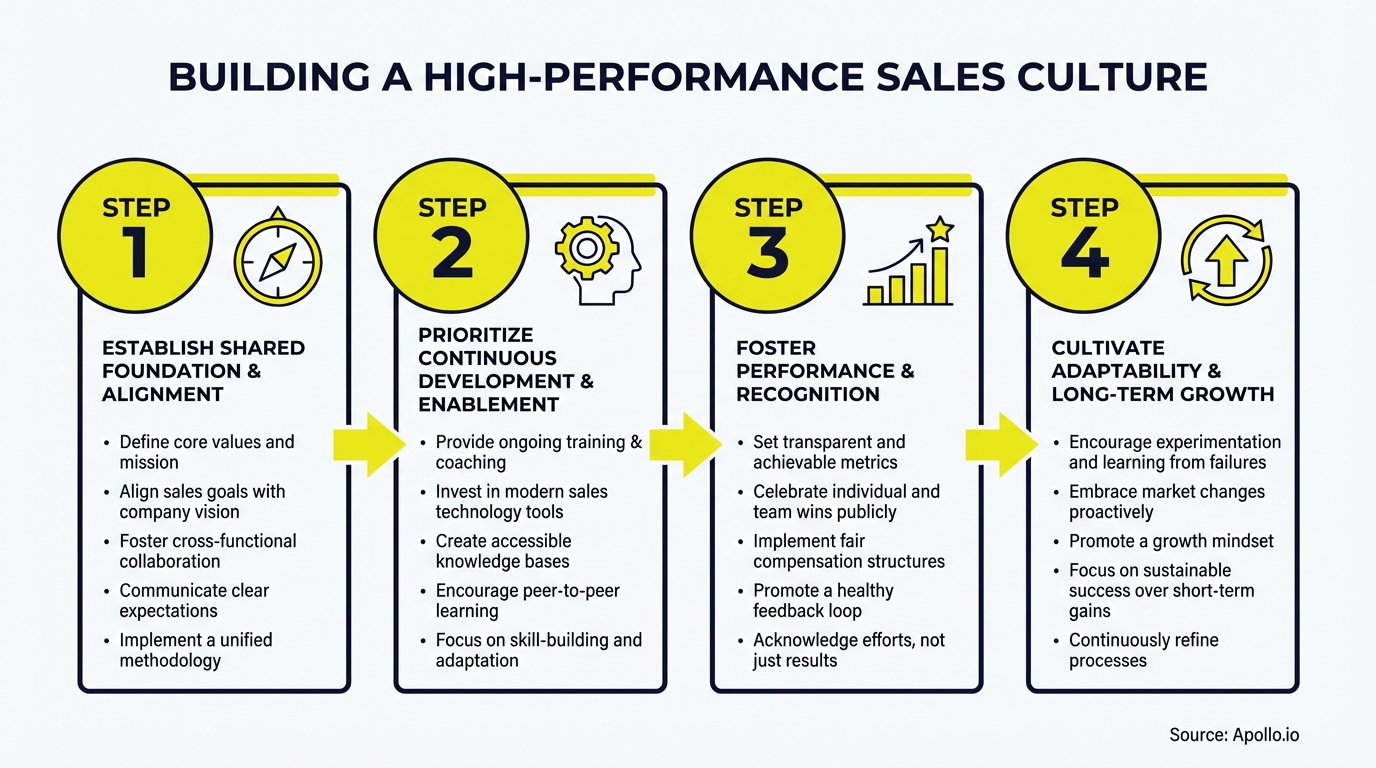What Is Sales Culture and How Do You Build One That Drives Revenue in 2026?

What Is Sales Culture and How Do You Build One That Drives Revenue in 2026?
Sales culture is the set of values, behaviors, and norms that define how a sales team operates, competes, and serves buyers. It shapes everything from how SDRs prospect to how sales leaders coach, and it directly affects revenue. According to Flame Learning, companies with strong sales cultures report up to 33% higher revenue growth compared to those without one. Yet most teams treat culture as a soft topic rather than a measurable performance driver. That gap is costly.
Building a strong sales culture in 2026 means aligning your team around buyer trust, consistent messaging, and continuous enablement. Learn how sales analytics and the right frameworks turn culture into a quantifiable competitive advantage.

Research Less, Close More With Apollo
Tired of your reps burning hours on manual lead research instead of selling? Apollo surfaces verified contacts instantly so your team spends time closing, not digging. Join 550K+ companies building pipeline faster.
Start Free with Apollo →Key Takeaways
- Strong sales cultures produce measurably higher revenue growth than teams without defined cultural frameworks.
- Inconsistent messaging between reps and marketing content actively damages buyer trust and pipeline.
- Career development investment directly correlates with improved commercial performance and rep retention.
- Omnichannel readiness is now a cultural requirement, not just a tactical choice.
- Apollo consolidates the tools SDRs, AEs, and RevOps need into one platform, reinforcing a unified sales culture.
What Is Sales Culture?
Sales culture is the collective identity of a sales organization: the shared expectations, daily rituals, coaching cadences, and performance standards that define how selling happens. It is not a mission statement on a wall.
It is visible in how managers run 1:1s, how reps handle objections, and how the team responds to missed quota.
Sales culture is often confused with sales strategy. Strategy defines what to pursue. Culture defines how the team shows up to pursue it. A strong culture makes strategy repeatable and scalable across every rep, channel, and market segment.
Why Does Sales Culture Matter for Revenue in 2026?
Sales culture has moved from a leadership talking point to a quantified performance lever. A Gartner study found that organizations investing in sales employees' career development are 2.6x more likely to improve commercial performance.
At the same time, buyer behavior is shifting in ways that punish cultures built on volume over relevance.
- 73% of B2B buyers actively avoid suppliers that send irrelevant outreach (Gartner, 2025).
- 69% of B2B buyers report inconsistencies between a seller's website content and what reps actually say (Gartner, 2025).
- Only 34% of sellers say they plan to stay at their current organization (Gartner Global Labor Market Survey, 2024).
Each of these problems is a culture problem. Irrelevant outreach reflects a culture that rewards activity over quality.
Messaging inconsistency reflects a culture without governance. Low retention reflects a culture that does not invest in people.
Fixing them requires structural changes, not motivational posters.
What Are the Core Components of a Strong Sales Culture Framework?
A sales culture framework has four interconnected pillars. Each one addresses a measurable gap in how modern sales teams operate.
| Pillar | What It Governs | Key Outcome |
|---|---|---|
| Messaging Governance | Single source of truth for sales content and talk tracks | Eliminates buyer-facing inconsistencies |
| Enablement and Coaching | Manager-led development, structured onboarding, career paths | Improves retention and quota attainment |
| Omnichannel Readiness | In-person, remote, and digital self-serve assets | Meets buyers where they are |
| Performance Accountability | KPIs, deal reviews, and coaching tied to outcomes | Drives consistent commercial results |
For a deeper look at which metrics to anchor each pillar, review what sales KPIs to track in 2026.

How Do Sales Leaders Build Messaging Consistency Across Their Teams?
Messaging inconsistency is one of the most damaging and underdiagnosed sales culture failures. When reps say something different from what buyers read on your website, trust erodes before the deal starts.
The fix is a governance model, not more training decks.
Practical steps for messaging governance:
- Create a single messaging standards document updated quarterly by marketing and sales leadership together.
- Build a content QA checkpoint into the onboarding process so new reps learn approved positioning from day one.
- Conduct monthly deal reviews that include a messaging audit, not just pipeline review.
- Use call intelligence to flag when reps drift from approved value propositions. Apollo's AI call assistant surfaces these gaps automatically.
When marketing and sales share one source of truth, pipeline-360 data shows the results: 75% of high-performing B2B organizations report mostly or fully aligned sales and marketing, compared to just 24% of low performers.
Struggling to keep your outreach relevant and consistent at scale? Automate personalized sequences with Apollo's multi-channel sales engagement platform and ensure every rep sends the right message to the right prospect.
Turn Blind Forecasts Into Pipeline Clarity
Pipeline forecasting a guessing game because your deal data is always a step behind? Apollo gives revenue teams real-time prospect intelligence so every call and forecast is grounded in fact. Join 90K paying customers closing with confidence.
Schedule a Demo →How Do SDRs and AEs Thrive Inside a Strong Sales Culture?
For SDRs, culture determines whether they feel equipped to hit quota or set up to fail. Data from Martal shows that up to 70% of B2B sales representatives missed their annual quota in 2024. The root cause is rarely effort. It is usually a lack of clear expectations, inconsistent coaching, and poor tooling.
What SDRs need from their culture:
- A defined ICP and messaging playbook so they prospect with precision, not volume.
- Weekly manager coaching focused on skill development, not just activity metrics.
- A clear career path from SDR to AE so high performers stay.
For AEs, culture shows up in how deals are reviewed and how losses are handled. As Rachel Akrug notes, while celebrating quota crushers is common, top companies also examine why others fell short. Deal loss reviews are a cultural ritual, not a blame exercise. Pair this with structured objection handling frameworks so AEs build skills from every lost deal.
RevOps leaders reinforce culture through data visibility. When every rep works from the same pipeline data and the same CRM hygiene standards, accountability becomes structural rather than personal. Apollo's deal management platform gives RevOps a single view of pipeline health, so culture and accountability are baked into the workflow.
What Role Does Omnichannel Play in Modern Sales Culture?
A buyer-centric sales culture must operate across every channel buyers use. McKinsey's 2024 B2B Pulse Survey found that buyers split their time evenly between in-person, remote, and digital self-service interactions.
A culture that only trains reps for in-person selling leaves two-thirds of buyer touchpoints underserved.
Omnichannel culture checklist for sales teams:
- Train reps on video-based discovery and remote demo delivery, not just in-person presentations.
- Build self-serve content (case studies, ROI calculators, comparison pages) that supports buyers researching independently.
- Equip reps with social outreach skills for professional networks as a complement to email and phone.
- Standardize follow-up cadences across channels so no lead falls through based on channel preference.
For proven tactics on building multi-channel habits into your team's daily workflow, see this breakdown of sales automation tools that reinforce omnichannel outreach.

How Do You Measure Sales Culture Health?
Culture is measurable. Track these signals to assess whether your sales culture is working or eroding:
- Quota attainment rate: The percentage of reps hitting target. Low rates signal coaching, messaging, or tooling failures.
- Rep retention rate: High turnover is a leading indicator of cultural dysfunction.
- Ramp time: How long it takes a new rep to reach full productivity reflects onboarding culture quality.
- Message consistency score: Auditable via call recordings; tracks whether reps use approved positioning.
- Pipeline coverage ratio: A healthy culture produces predictable pipeline, not lumpy coverage driven by a few top performers.
Connect these metrics to your revenue operations framework so culture health is reviewed alongside commercial performance in every leadership meeting.
How Do You Build a Sales Culture That Scales in 2026?
A strong sales culture does not emerge from a single all-hands meeting. It is built through repeatable systems, consistent leadership behavior, and the right tools reinforcing the right habits every day.
Five-step action plan for sales leaders and founders:
- Define your cultural non-negotiables. Write down three behaviors every rep must demonstrate regardless of tenure or title.
- Build a messaging governance system. One document. One owner. Reviewed quarterly with both sales and marketing present.
- Invest in career development. Gartner's data is clear: organizations that develop their sellers are 2.6x more likely to improve commercial performance.
- Instrument your culture with data. Use sales productivity metrics to make culture visible and coachable.
- Consolidate your tech stack. Tool sprawl fragments culture. When reps work across disconnected systems, consistency breaks down. As Cyera put it: "Having everything in one system was a game changer."
Apollo gives SDRs, AEs, RevOps, and sales leaders a unified platform covering prospecting, engagement, enrichment, and deal management. "We reduced the complexity of three tools into one," said Collin Stewart of Predictable Revenue. That simplicity is a culture accelerator.
Ready to build a sales culture backed by the right data and tools? Get Leads Now and see how Apollo's all-in-one GTM platform supports every layer of your sales culture.
Prove Pipeline ROI Before Next QBR
Budget approval stuck on metrics you can't quantify? Apollo delivers measurable pipeline impact your leadership can act on. Leadium 3x'd revenue — start your free trial and show ROI fast.
Start Free with Apollo →
Kenny Keesee
Sr. Director of Support | Apollo.io Insights
With over 15 years of experience leading global customer service operations, Kenny brings a passion for leadership development and operational excellence to Apollo.io. In his role, Kenny leads a diverse team focused on enhancing the customer experience, reducing response times, and scaling efficient, high-impact support strategies across multiple regions. Before joining Apollo.io, Kenny held senior leadership roles at companies like OpenTable and AT&T, where he built high-performing support teams, launched coaching programs, and drove improvements in CSAT, SLA, and team engagement. Known for crushing deadlines, mastering communication, and solving problems like a pro, Kenny thrives in both collaborative and fast-paced environments. He's committed to building customer-first cultures, developing rising leaders, and using data to drive performance. Outside of work, Kenny is all about pushing boundaries, taking on new challenges, and mentoring others to help them reach their full potential.
Don't miss these
Sales
Inbound vs Outbound Marketing: Which Strategy Wins?
Sales
What Is a Sales Funnel? The Non-Linear Revenue Framework for 2026
Sales
What Is a Go-to-Market Strategy? The Data-Driven Blueprint That Actually Works
See Apollo in action
We'd love to show how Apollo can help you sell better.
By submitting this form, you will receive information, tips, and promotions from Apollo. To learn more, see our Privacy Statement.
4.7/5 based on 9,015 reviews
